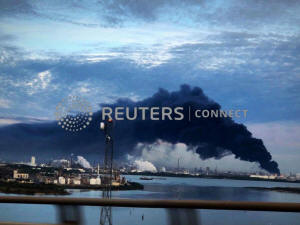|
Mitsui petrochemical unit probed after
Texas fire rages for days
 Send a link to a friend
Send a link to a friend
 [March 21, 2019]
By Collin Eaton and Erwin Seba [March 21, 2019]
By Collin Eaton and Erwin Seba
HOUSTON (Reuters) - State and local
investigators have begun probing a petrochemical storage company outside
Houston where a massive fire fed by giant tanks of fuel burned for days,
darkening the skies with soot for dozens of miles, officials said.
The blaze at Mitsui unit Intercontinental Terminals Co (ITC) in Deer
Park, Texas, began on Sunday and was not extinguished until early
Wednesday. It destroyed 11 tanks of gasoline and other fuels. Before the
fire, the facility had 242 tanks able to hold up to 13.1 million barrels
of fuels.
There were no injuries and a cause of the fire has not been determined,
officials said.
The state's environmental regulator said it has begun an investigation
into the incident. The agency has cited Intercontinental Terminals for
violations of state air-emissions rules 39 times in the last 16 years.

The Texas Commission on Environmental Quality estimated that on the
first day of the fire 6.2 million pounds of carbon monoxide and
thousands of pounds of nitrogen oxides, sulfur dioxide and toluene were
released.
ITC has a history of citations for non-compliance with state and federal
environmental rules, said Luke Metzger, executive director of advocacy
group Environment Texas.
"Hopefully, this will spur some action from lawmakers to increase
accountability for polluters," Metzger said.
ITC did not respond to a request for comment.
Adam Adams, an official for the U.S. Environmental Protection Agency
(EPA), said he did not know if it was conducting its own investigation.
The Harris County district attorney's office assigned an environmental
prosecutor to monitor local and federal reviews of the fire for possible
wrongdoing, said spokesman Dane Schiller.
That office last year charged chemical company Arkema North America and
two of its executives with endangering the public with toxic emissions
released during a fire that caused at least 21 injuries.
[to top of second column]
|

Smoke rises from a fire burning at the Intercontinental Terminals
Company in Deer Park, east of Houston, Texas, U.S., March 18, 2019.
Jaimie Meldrum/@jamiejow/Handout via REUTERS

The EPA's Adams said air-monitoring systems near the site along the
nation's busiest petrochemical shipping port found no hazardous
levels of volatile organic compounds or particulate matter.
The federal agency will test local waterways for possible
contamination from the millions of gallons of water and foam dropped
on the fire since Sunday morning. Some of the liquids leaked out of
a containment dike and into a nearby drainage ditch that feeds into
the Houston Ship Channel, he said.
Measurements of soot and volatile organic compounds from the fire
never exceeded dangerous levels, Adams and other officials said. A
dark plume was visible from dozens of miles away and local residents
reported acrid smells.
"We were fortunate there were good winds and vertical mixing that
allowed the plume to rise and disperse more readily," said Daniel
Cohan, an associate professor of environmental engineering at Rice
University in Houston.
The smoke likely does not pose a health risk beyond mild irritation
for most healthy adults in Houston, said Adrian Shelley, director of
the Texas office of the non-profit consumer advocacy group Public
Citizen.

But those with respiratory illnesses such as asthma and emphysema
were at higher risk of being affected by the elevated levels of
particulate matter, Shelley said.
(Reporting by Collin Eaton and Erwin Seba; writing by Gary
McWilliams; Editing by David Gregorio)
[© 2019 Thomson Reuters. All rights
reserved.]
Copyright 2019 Reuters. All rights reserved. This material may not be published,
broadcast, rewritten or redistributed.
Thompson Reuters is solely responsible for this content. |